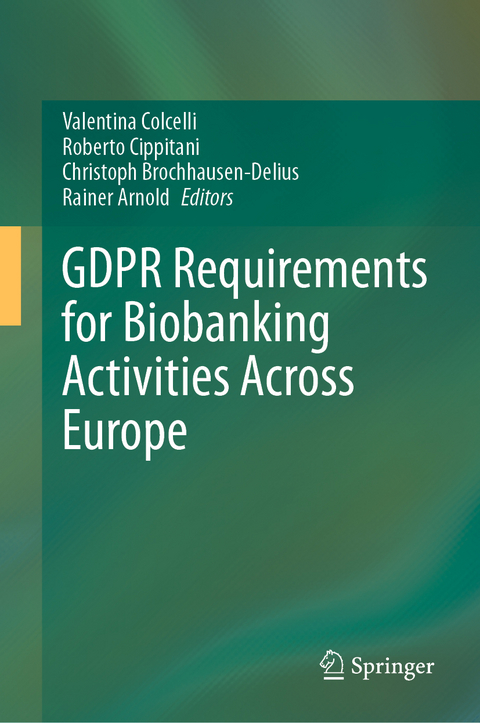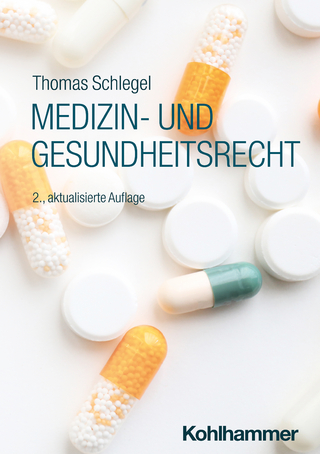
GDPR Requirements for Biobanking Activities Across Europe
Springer International Publishing (Verlag)
978-3-031-42943-9 (ISBN)
The book deals with the effective operation of the rules related to biomedical research and pays attention to the activities of the national legislatures of the 27 Member States in the field of scientific research. This multilevel system has an impact on biobanking activity. The book answers questions realized by operators on the main biobanks around the EU in the field of GDPR. The authors and editors used the questions born from brainstorming among members of the Association European, Middle East & Africa for Biopreservation and Biobanking (ESBB) to offer to the operators in biobanking activity and researchers quickly answer to their daily questions, but with authors highest quality. Further the book provides a comprehensive review of the rapidly expanding field of biobanking. It provides researchers and scholars working on biobanking and bio-sharing and more in general in the university hospitals and clinical trial consortiums, and companies, biomedical researchers, but also jurists and the professionals (in particular judges, lawyers, officers) an instrument rigorous but easy to use of the GDPR in the case of biobanking activities. The book identifies a methodological path to tackle the legal or ethical problem on a specific scientific-technological to verify existing solutions and give ideas for future applications. The importance of the legal solution influences the implementation of the development of the biobanking activity service itself.
lt;p>Valentina Colcelli Ph.D., is a Researcher of Researcher of National Research Council (CNR). Her main research interests focus on the interaction of domestic and European law in shaping rights and interests, and on market regulation. She also has a research interest in a general reflection on the juridical good beyond the EU legal system, internal market regulation, Technology Transfer, legal and ethical issues in research and innovation activities, contracts for technology transfer and effective judicial protection of biodiversity in light of fundamental rights. She published books concerning EU integration and more than 80 papers. She is a member of several projects funded by the EU and long-lasting research cooperation international research groups. Among them, Valentina Colcelli is a member of the Umbria Region projects called I-ProCancer H2020, and "NAVIGATOR" and "UMBRIA BIOBANK". In the above-mentioned project, she is involved in the WPs devoted to the definition of the privacy policy of the biobanks, prior consent information definition and drafting Material Transfer Agreement. She was a member of the Scientific Comity and speaker in the International Conference held in Perugia (2017) "Biobanks In The Era Of Personalized Medicine: Objectives And Challenges". She is co-chair of Working Group "Regulatory, Ethics, and GDPR" for European, Middle East &African fro Biopreservation and Biobanking" and Co-coordinator of Working Group on Ethical, Legal issues related to Biobank and Research activities (Realise).
Introduction.- Medical research and data protection in Europe. The emergence of general legal principles.- Part I Syllabus of the burning questions.- Anonymisation (Part I) 'What is the state-of-the-art of anonymisation in data-driven health research and its role in the "European Health Data Space Regulation"?'.- Anonymisation - The trap for biobanking (Part II) 'Why the anonymisation could be a trap for the biobanking activity? Can there really be anonymisation in the research biobanks?'.- Applying national law in cross-border research activity 'Which national law should be applied in cross-border research activity in the local implementation of GDPR?'.- Archived tissue 'What is the potential use for research under GDPR for archived tissue specimens obtained in a diagnostic or therapeutic pattern?'.- Blockchain and dynamic consent 'Can the blockchain realise proper support for dynamic consent?'.- Brexit effects 'What are the "Brexit effects" on the exchange of data and biological samples with the UK?'.- Broad consent 'Do patients have to be informed about the concrete research projects for which their data and biosamples are to be used? Is so-called broad consent adequate?'.- Cloud 'How is it possible to exchange research and personal data using the cloud without being a danger to patients?'.- Consent requirements 'What are the terms and conditions of informed consent?'.- Consent and assent by children 'Management of assent and consent by children. What should be done when they reach the appropriate age: Obligations and recommendations?'.- Consent & Technology 'Is dynamic consent the solution or can an interactive website solve the problem of consent?'.- Consent from children andvulnerable people 'What protection is provided to people who are not able to give consent or are restricted in their ability to give consent, for example, children or people with disabilities?'.- Consent withdrawal 'What is the procedure if consent will later be withdrawn?' .- Covid-19 'Are the rules of the GDPR on scientific research - if correctly applied - able to guarantee personal health data in the context of Covid-19 research activities?'.- Dynamic consent 'According to sentence three of recital 33, persons whose data are to be stored for future research projects should be given the opportunity to provide their consent to only certain areas of research or parts of research projects to the extent permitted by the purpose pursued. How can this be realised?' .- Ethics committees 'To what extent are ethics committees relevant for the activities of the biobank?'.- Ethic & Biobanks 'What are the steps needed to implement bioethical issues in a population-based and disease-based biobank?'.- Ethical principles and legal provisions 'What ethical principles apply to biobanking activities?'.- EU legislation and health data protection 'For the processing of medical personal data in biobanking activities, is the GDPR the sole reference legislation in the EU?'.- Forensic databases (Part I) 'Forensic use of research biobanks: How does the GDPR regulate the issue?'.- Forensic databases (Part II) 'How does EU law address issues concerning access for forensic purposes to research biobanks?'.- Future research 'How to deal with the problem that future research may often not be able to be defined in narrow and specific terms, as it depends on the current state of research?'.- Genetic data 'What are the ethical-legal consequences entailed in the exceptional nature of genetic information?'.- Granularity 'When processing personal data and biological material in research activities, is it possible to derogate from the general rules and, in particular, from the rule of granularity of consent?'.- Imaging biobank 'What are the areas of the GDPR bearing on an image biobank?'.- Industry perspective 'Contracting in the light of the GDPR: What are the key considerations for transfers of biosamples and data from an industry perspective?'.- Joint controller agreement 'What is the function of the joint controller agreement in sharing personal data with a large research consortium or biobank infrastructures?'.- Legitimate interests 'Are legitimate interests lawful grounds for processing retrospective health data and tumour tissue?'.- Ownership of human biological material 'To whom does the "ownership" of the human body and its parts belong? Who has the right to dispose of it and for what purpose?'.- Paediatric biobanks (general overview) 'How to tackle the protection of personal data and other ethical issues in a paediatric biobank?.- Public Interest Who decides on the existence of a public interest?'.- Rare diseases and data protection (Part I) 'How to enable research on rare diseases while protecting personal data?'.- Rare diseases and legal, ethical, technical and societal needs (Part II) 'Why are biobanks and research networks able to support data protection issues in rare disease research?'.- Rare paediatric diseases 'Does the GDPR support dynamic consent/assent strategies for rare paediatric diseases?'.- Residual material 'What applies to the processing of residual material with its associated data? Is explicit consent required for this?'.- Retention time - conservation of personal data (Part I) 'How long can personal data be stored in a biobank?'.- Retention time - conservation of tissues (Part II) 'How long can tissues be stored in a biobank?'.- Retrospective research 'Is the use of broad consent for retrospective research on data and tissue possible in the framework of GDPR?'.- Scientific research and the biomedical sector. Requirements and methods for planning and managing a "data protection by design" project. 'How can a scientific research project be planned and managed to comply "by design" with GDPR?'.- Secondary use (Part I) 'What does secondary use mean for research using tissue specimens obtained in a diagnostic or therapeutic setting, in the light of the GDPR?'.- Secondary use and dual use of biomaterial samples (Part II) 'Does broad consent include the reuse and dual use of biomaterial samples and their associated personal data?'.- Transfer of the personal data for research purposes towards non-EU countries 'How is it possible to transfer personal data for research purposes to non-EU countries?.- Users 'Who are the users in the context of biobanks? What are the factors to consider when dealing with the human component?'.- Part II Biobanking legal and ethical requirements across Europe: National reports (in alphabetic order).- Instead of a preface Towards regulation for the European health data research: A comparative analysis.- National report: Austria.- National report: Belgium.- National report: Bulgaria.- National report: Croatia.- National report: Cyprus.- National report: Czech Republic.- National report: Denmark.- National report: Estonia.- National report: Finland.- National report: France.- National report: Germany.- National report: Greece.- National report: Hungary.- National report: Ireland.- National report: Italy.- National report: Latvia.- National report: Lithuania.- National report: Luxemburg.- National report: Malta.- National report: Netherlands.- National report: Poland.- National report: Portugal.- National report: Romania.- National report: Slovakia.- National report: Slovenia.- National report: Spain.- National report: Sweden.- National report: United Kingdom.- Conclusion.
| Erscheinungsdatum | 29.12.2023 |
|---|---|
| Co-Autor | Sabrina Brizioli, Alessandra Langella |
| Zusatzinfo | XV, 650 p. 1 illus. |
| Verlagsort | Cham |
| Sprache | englisch |
| Maße | 155 x 235 mm |
| Gewicht | 1160 g |
| Themenwelt | Recht / Steuern ► Privatrecht / Bürgerliches Recht ► Medizinrecht |
| Schlagworte | Biobank-based research • biological materials • modern medicine • Research and GDPR • research exemption |
| ISBN-10 | 3-031-42943-5 / 3031429435 |
| ISBN-13 | 978-3-031-42943-9 / 9783031429439 |
| Zustand | Neuware |
| Haben Sie eine Frage zum Produkt? |
aus dem Bereich


